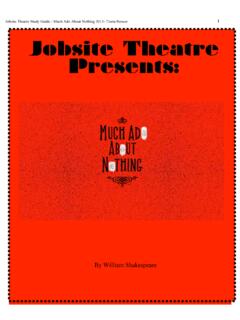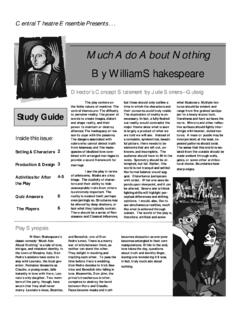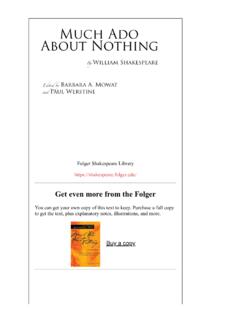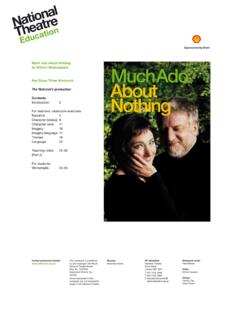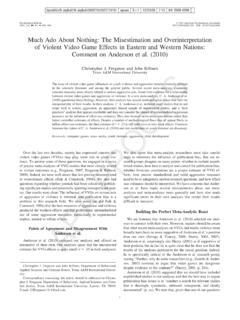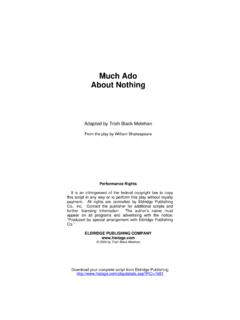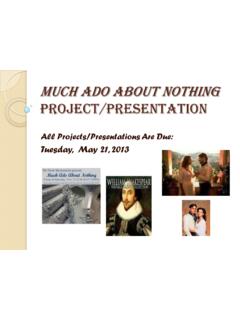Transcription of Much Ado About Nothing - Idaho Shakespeare Festival
1 much Ado About Nothing by William Shakespeare Please visit our website at for YouTube links to posts from the director and the cast! William Shakespeare (1564-1616), English playwright and poet, is recognized in much of the world as the greatest of all dramatists. Shakespeare s plays communicate a profound knowledge of the wellsprings of human behavior, revealed through portrayals of a wide variety of characters. His use of poetic and dramatic means to create a unified aesthetic out of a multi-plicity of vocal expressions and actions is recognized as a singular achievement, and his use of poetry within his plays to express the deepest levels of human motivation in individual, social, and universal situations is considered one of the greatest accomplishments in literary history. A complete, authoritative account of Shakespeare s life is lacking, and thus much supposition surrounds relatively few facts.
2 It is commonly accepted that he was born in 1564 and it is known that he was baptized in Stratford-upon-Avon, Warwickshire, England. The third of eight children, he was probably educated at the local grammar school. As the eldest son, Shakespeare ordinarily would have been apprenticed to his father s shop so that he could learn and eventually take over the business, but according to one account he was apprenticed to a butcher because of declines in his father s financial situation. According to another account, he became a schoolmaster. In 1582 Shakespeare married Anne Hathaway, the daughter of a farmer. He is supposed to have left Stratford after he was caught poaching in the deer park of Sir Thomas Lucy, a local justice of the peace. Shakespeare and Anne Hathaway had a daughter, Susanna, in 1583 and twins Hamnet and Judith in 1585.
3 Hamnet did not survive childhood. Shakespeare apparently arrived in London About 1588 and by 1592 had attained success as an actor and a playwright. Shortly thereafter he secured the patronage of Henry Wriothesley, 3rd Earl of Southampton. The publication of Shakespeare s two fashionably erotic narrative po-ems Venus and Adonis (1593) and The Rape of Lucrece (1594) and of his Sonnets (published 1609, but circulated previously in manuscript form) established his reputation as a gifted and popular poet of the Renaissance (14th century to 17th century). The Sonnets describe the devo-tion of a character, often identified as the poet himself, to a young man whose beauty and vir-tue he praises and to a mysterious and faithless dark lady with whom the poet is infatuated. The ensuing triangular situation, resulting from the attraction of the poet s friend to the dark lady, is treated with passionate intensity and psychological insight.
4 Shakespeare s modern rep-utation, however, is based primarily on the 38 plays that he apparently wrote, modified, or col-laborated on. Although generally popular in his time, these plays were frequently little es-teemed by his educated contemporaries, who considered English plays of their own day to be only vulgar entertainment. About THE PLAYWRIGHT WILLIAM Shakespeare Shakespeare s professional life in London was marked by a number of financially advanta-geous arrangements that permitted him to share in the profits of his acting company, the Chamberlain s Men, later called the King s Men, and its two theaters, the Globe Theatre and the Blackfriars. His plays were given special presentation at the courts of Queen Elizabeth I and King James more frequently than those of any other contemporary dramatist. It is known that he risked losing royal favor only once, in 1599, when his company performed the play of the deposing and killing of King Richard II at the request of a group of conspirators against Elizabeth.
5 In the subsequent inquiry, Shakespeare s company was absolved of complicity in the conspiracy. After About 1608, Shakespeare s dramatic production lessened and it seems that he spent more time in Stratford, where he had established his family in an imposing house called New Place and had become a leading local citizen. He died in 1616, and was buried in the Stratford church. Until the 18th century, Shakespeare was generally thought to have been no more than a rough and untutored genius. Theories were advanced that his plays had actually been written by someone more educated, perhaps statesman and philosopher Sir Francis Bacon or the Earl of Southampton, who was Shakespeare s patron. However, he was celebrated in his own time by English writer Ben Johnson and others who saw in him a brilliance that would endure. Since the 19th century, Shakespeare s achievements have been more consistently recognized, and throughout the Western world he has come to be regarded as the greatest dramatist ever.
6 Shakespeare , William, Microsoft Encarta Online Encyclopedia 2001 Contributed By: Kent Hieatt, , Professor Emeritus of English, University of Western Ontario. Author of Chaucer, Spenser, Milton: Mythopoetic Continuities and Transformations. CONTEXT FOR much Ado About Nothing much Ado About Nothing is generally considered one of Shakespeare s best come-dies, because it combines elements of robust hilarity with more serious meditations on honor, shame, and court politics. It was probably written in 1598 and 1599, as Shake-speare was approaching the middle of his career. Like As You Like It and Twelfth Night, much Ado About Nothing , though interspersed with darker concerns, is a joyful comedy that ends with multiple marriages and no deaths. Although one of the features of Shakespearean comedy is that no one dies, it would be a mistake to assume that death is absent from this genre.
7 Often, Shakespeare s comedies are more accepting of death than his tragedies, treating death as part of the natu-ral cycle of life. much Ado About Nothing is no exception, and Hero s pretending to die of humiliation makes death more vividly present here than in any of Shakespeare s other comedies. The crisis that lies at the center of much Ado About Nothing troubles many readers and viewers, since the play creates a very strong sense of anger, betrayal, hatred, grief, and despair among the main characters. Although the crisis ends quickly, much Ado About Nothing sometimes seems only steps away from becoming a tragedy. Indeed, the line between tragedy and comedy is sometimes fuzzy. Many critics have noted that the plot of much Ado About Nothing shares significant elements with that of Romeo and Juliet. much Ado About Nothing also shares many features with Shake-speare s late play The Winter s Tale, which most critics assign to a different genre that of problem comedy or romance.
8 Like Hermione in The Winter s Tale, Hero stages a false death only to come back to life once her beloved has repented. Although the young lovers Hero and Claudio provide the main impetus for the plot, the courtship between the older, wiser lovers Benedick and Beatrice is what makes much Ado About Nothing so memorable. Benedick and Beatrice argue with delightful wit, and Shakespeare develops their journey from antagonism to sincere love and affection with a rich sense of humor and compassion. Since Beatrice and Benedick have a history behind them that adds weight to their relationship, they are older and more mature than the typical lovers in Shakespeare s comedies, though their unhealthy competitiveness re-veals them to be childish novices when it comes to love. SYNOPSIS OF much Ado About Nothing Don Pedro, Prince of Arragon, pays a visit to Leonato the governor of Messi-na, while returning from a victorious campaign against his rebellious brother, Don John.
9 Accompanying him are two of his officers, Benedick and Claudio. While in Messina, Claudio falls for Leonato's daughter, Hero; Benedick ver-bally spars with Beatrice, the governor's niece. The budding love between Claudio and Hero prompts Don Pedro to arrange with Leonato for the mar-riage. Meanwhile, the trickery begins as Don Pedro (with the help of Leonato and Claudio) attempts to sport with Benedick and Beatrice in an effort to make the two of them fall in love. Likewise, Hero and her waiting woman help to set up Beatrice. Both Benedick and Beatrice will think that the other has pro-fessed a great love for them. The marriage of Claudio to Hero is set to go. Don John ostensibly recon-ciled with his brother despises Claudio, however, and plots against him. First, he tells Claudio that Pedro wants Hero for himself; next, he enlists the aid of his henchman Borachio and one of Hero's gentlewomen disguised as Hero to stage an encounter that will bring Hero's virtue into question.
10 Clau-dio falls for the ruse and denounces Hero at the altar. She faints from dis-grace and is hidden away while word is sent out that she has died from shame. Fortunately for Hero, Borachio is arrested while drunkenly boasting of his part in the plan. With Borachio's confession, Hero is to be exonerated. Leona-to demands a public apology from Claudio, then tells him that he will allow Claudio to marry one of his nieces in Hero's place a niece that turns out to be none other than Hero herself. Claudio and Hero are reunited, Benedick and Beatrice will wed alongside them, and they receive the news that the man behind the scandal, Don John, has been apprehended. ~Synopsis from ~STUDY QUESTIONS~ 1. In the context of today s world and your lives, is it hard to believe that Hero and Claudio really love each other? Why or why not?
